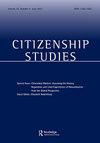弱势移民的治理:庇护接收中的程序、资源和影响
IF 1.9
3区 社会学
Q3 POLITICAL SCIENCE
引用次数: 1
摘要
本文通过两个案例研究,探讨脆弱性是如何被理解、挪用并转化为程序法规和实际官僚实践的:1)比利时对寻求庇护者的接收;2)在乌干达的人道主义行动中接待寻求庇护者和提供援助服务。这两个案例表明,“弱势群体”以及相应的程序性和实质性保障或保护往往是灵活定义的,这一方面取决于公共机构可获得的资源,另一方面取决于具体的机构准则和“弱势”地位的定义。我们的人种学数据显示,接待官员在他们想要帮助的愿望和他们遵守国家政策的义务之间,令人不安地夹在中间。为了调和这些(有时是相互矛盾的)义务,他们打破行政指导方针,利用自己的资源弥补机构的缺陷,或者有系统地拒绝移民的请求,以期证明当前接待政策的荒谬。本文章由计算机程序翻译,如有差异,请以英文原文为准。
The governance of vulnerable migrants: procedure, resources and affect in asylum reception
ABSTRACT This article explores how vulnerability is understood, appropriated and translated into procedural regulations and actual bureaucratic practices based on two case studies: 1) the reception of asylum seekers in Belgium; and 2) the reception of asylum seekers and provision of aid services in humanitarian operations in Uganda. These two cases demonstrate that ‘vulnerable groups’ and the corresponding procedural and substantial safeguards or protections are often defined flexibly, depending on the resources available to public institutions on the one hand, and specific agency guidelines and definitions of ‘vulnerable’ status on the other. Our ethnographic data show that reception bureaucrats are uncomfortably wedged between their desire to help and their obligation to follow state policies. To reconcile these (sometimes contradictory) obligations, they break administrative guidelines, use their own resources to make up for the shortcomings of their institution, or systematically decline migrants’ requests in the hope of demonstrating the absurdity of current reception policies.
求助全文
通过发布文献求助,成功后即可免费获取论文全文。
去求助
来源期刊

Citizenship Studies
POLITICAL SCIENCE-
CiteScore
3.60
自引率
11.10%
发文量
85
期刊介绍:
Citizenship Studies publishes internationally recognised scholarly work on contemporary issues in citizenship, human rights and democratic processes from an interdisciplinary perspective covering the fields of politics, sociology, history and cultural studies. It seeks to lead an international debate on the academic analysis of citizenship, and also aims to cross the division between internal and academic and external public debate. The journal focuses on debates that move beyond conventional notions of citizenship, and treats citizenship as a strategic concept that is central in the analysis of identity, participation, empowerment, human rights and the public interest.
 求助内容:
求助内容: 应助结果提醒方式:
应助结果提醒方式:


